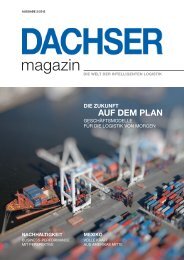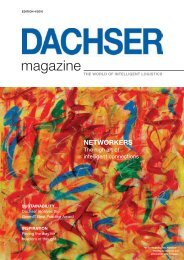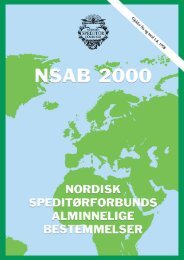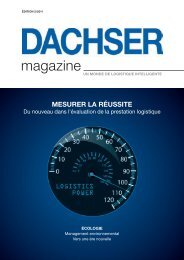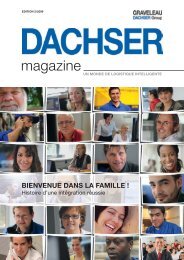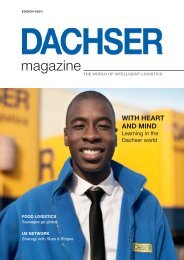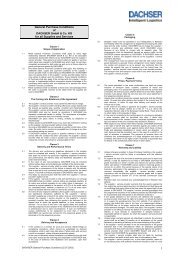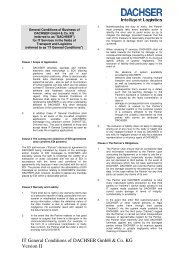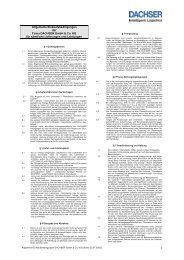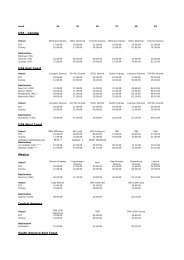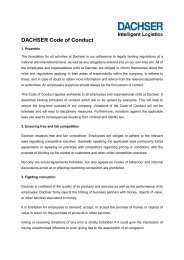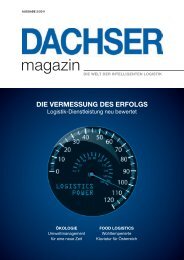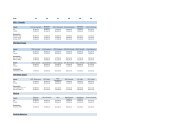Moving Europe
Moving Europe
Moving Europe
Create successful ePaper yourself
Turn your PDF publications into a flip-book with our unique Google optimized e-Paper software.
EDITION 3/2011<br />
magazine<br />
EUROHUBS<br />
<strong>Moving</strong> <strong>Europe</strong><br />
THE WORLD OF INTELLIGENT LOGISTICS<br />
AIR & SEA<br />
Dedicated new<br />
industry modules<br />
SOLAR TECHNOLOGY<br />
Answering the boom<br />
with lean processes
SNAPSHOT<br />
“You sometimes have to risk<br />
what’s already good in order to<br />
achieve something even better.”<br />
Lakewood mastermind Martin Seeliger has been<br />
building legendary guitars for 25 years. Given<br />
the discerning nature of his target group,<br />
he puts his success down to a healthy portion<br />
of ambition and just a touch of impatience.<br />
02 DACHSER magazine
FORUM<br />
People and markets: 04<br />
Aerodynamics for sustainable technological<br />
progress. Also introducing the new country<br />
organization in Singapore, and the trend<br />
towards global personnel<br />
Dachser face-to-face: Strong regional roots.<br />
Bernhard Simon meets Hannes Feneberg 08<br />
NETWORK<br />
Czech Republic: Logistics growth driver<br />
from the new heart of <strong>Europe</strong> 10<br />
COMPETENCE<br />
Solar energy: Green and lean logistics<br />
for Donauer Solartechnik 12<br />
DIY-Logistics: Designing innovative<br />
supply chains with Globus DIY stores 13<br />
Air & Sea Logistics: New customized<br />
concepts for individual sectors of industry 20<br />
COVER STORY<br />
<strong>Europe</strong>an Logistics: How Dachser<br />
networks <strong>Europe</strong> with its Eurohub system 14<br />
Scrapbook:<br />
Good news and competition 23<br />
F Our DACHSER<br />
eLetter is packed with even<br />
more information.<br />
To find out more, visit:<br />
www.dachser.com/eletter-en<br />
04<br />
10<br />
12<br />
14<br />
CONTENTS<br />
Imprint<br />
Published by: Dachser GmbH & Co. KG, Memminger Str. 140, 87439 Kempten, Germany, Internet: www.dachser.com Overall responsibility: Dr Andreas Froschmayer Editor-in-chief:<br />
Jörn Erdmann, Tel.: +49 831 5916-1421, Fax: +49 831 5916-8-1421, e-mail: joern.erdmann@dachser.com Editors: Daniela Himmel, Petra Hunger, Martin Neft, Aljoscha Kertesz, Christian Weber<br />
Publisher: Burda Creative Group GmbH, Konrad-Zuse-Platz 11, 81829 Munich, Germany, Tel.: +49 89 30620-0, Fax: -100 Managing director: Dr-Ing. Christian Fill Project manager Burda<br />
Creative Group: Marcus Schick Design: Ralph Zimmermann Photos: all photos Dachser except Lakewood (p. 2), Daimler (p. 4), Siemens (p. 4), Donauer Solar (p. 12), iStock (p. 4, 5, 6, 7, 10, 11, 12,<br />
13, 17, 21, 22, 23), T, Globus Baumarkt (p. 17), Thorsten Jochim (p. 1, 18–23), Ute Schmidt/bildfolio (p. 21), kunstschule.net (p. 23), Illustration: Ralph Zimmermann (p. 8) Printer: AZ Druck und<br />
Datentechnik GmbH, 87437 Kempten, Germany Circulation: 38,000/52nd volume Publication: 4 x per year Languages: German, English, French. The DACHSER magazine is printed on<br />
LuxoSatin paper which meets the PEFC standards for sustainable forest management.<br />
DACHSER magazine 03
FORUM: PEOPLE & MARKETS<br />
Research & development<br />
Wind and weather<br />
Temperatures ranging from minus 40 to plus 60 degrees Celsius, hurricanes with wind<br />
speeds up to 265 kilometres an hour, tropical rainfall and heavy snowstorms: all<br />
part of the standard repertoire in two new climatic wind tunnels recently<br />
opened by Daimler at its Mercedes Benz Technology Centre in Sindelfingen.<br />
The new climatic wind tunnels will allow test engineers to optimize<br />
new vehicles or components for all possible wind and weather conditions<br />
at a very early stage in the development process. “In our<br />
new climatic wind tunnels we can create any climatic conditions<br />
we choose, to replicate any of the seasons. It’s all done with<br />
very narrow tolerances so that the tests can be repeated at<br />
any time,” says Dr Thomas Weber, member of the Board of<br />
Management of Daimler AG, Group Research & Mercedes-Benz Cars. For example, in the new cold<br />
tunnel it’s even possible to find out whether snow swirled up by a truck driving ahead of the car is<br />
likely to block the air intakes.<br />
Aviation<br />
Flying hybrids<br />
The “DA36 E-Star”, or “Cri-Cri” for short, is set to<br />
change aviation. At the Paris Air Show in June,<br />
Siemens, Diamond Aircraft and EADS presented the<br />
world’s prototype two-seater motor glider with serial<br />
hybrid electric drive. It is hoped this technology,<br />
which has so far only been used in electric cars, will<br />
in future help cut fuel consumption and emissions<br />
by as much as 25 percent. A small Wankel combustion<br />
engine drives a generator to power a 70-kilowatt<br />
electric engine that runs the aircraft’s propeller. A battery system supplies additional power during<br />
takeoff and ascent. The batteries are recharged during cruising with low aerodynamic drag.<br />
04 DACHSER magazine
AERODYNAMICS<br />
Optimized engines reduce emissions and fuel<br />
consumption. But the tractor is not the only factor<br />
relevant for energy consumption. Semitrailers<br />
can also make a significant contribution<br />
to improving the ecological balance sheet. At<br />
this year’s transport logistic trade fair, Dachser<br />
for the first time presented its aerodynamically<br />
optimized test semi-trailer. The futuristic-looking<br />
side panels immediately catch the eye. To<br />
ensure these do not impair road use, they have<br />
been designed so that operating and service<br />
units are still readily accessible. But the side<br />
panels alone aren’t all. The semi-trailers also<br />
have smooth-sided superstructures, internal<br />
door-locking gear and tyres with reduced<br />
rolling resistance, cutting fuel consumption by<br />
up to five percent. Assuming an annual mileage<br />
of 160,000 kilometres, this is equivalent to<br />
2,760 litres of diesel. The trailers with reduced<br />
aerodynamic drag are currently being tested at<br />
FORUM: PEOPLE & MARKETS<br />
It is one of the tallest and most prestigious buildings in the<br />
world: the Taipei 101 Building in the financial centre of Taiwan’s<br />
capital city. The world’s tallest office building is 101 storeys high<br />
and measures a staggering 508 metres. Architecturally, it is modelled on a bamboo cane: strong<br />
and yet flexible – designed to withstand even earthquake tremors and typhoon winds. To offset<br />
the extreme movements of the building, 400 metres up structural engineers suspended a 660tonne<br />
gilded steel pendulum with a diameter of 5.50 metres. Tuned mass dampers help to reduce<br />
the amplitude of mechanical vibrations during strong wind loads by up to half. For its intelligent<br />
systems and innovative construction technology, Taipei 101 has recently earned the renowned<br />
US Green Building Council’s “Leadership in Energy and Environmental Design” (LEED)<br />
platinum certification.<br />
Driving experience<br />
Trailers from the wind tunnel<br />
Michael Schilling,<br />
managing director of<br />
Dachser’s <strong>Europe</strong>an Network<br />
Management & Logistics<br />
Systems business unit<br />
Taipei 101<br />
Bamboo<br />
in the wind<br />
a number of Dachser branch offices, both as<br />
box and refrigerated semi-trailers for food.<br />
“The team from the Technical Equipment/<br />
Movables department is working hand in hand<br />
with manufacturers on testing the sustainability<br />
of new technologies,” says Cornelia Blenk,<br />
responsible for Trailer/Commercial Vehicles<br />
fleet management at Dachser. “This allows us<br />
to further optimize energy consumption and<br />
improve the CO 2 balance.”<br />
hh Combining<br />
innovative technologies<br />
and optimized capacity<br />
utilization helps to lower CO2 emissions Michael Schilling<br />
DACHSER magazine 05
FORUM: PEOPLE & MARKETS<br />
Singapore<br />
Entering new markets<br />
in the “Lion City”<br />
Dachser is further expanding its services portfolio in the Asia-Pacific<br />
region. With the foundation of a new country organization in Singapore,<br />
the company is now present with a total of 55 branch offices in<br />
eight countries across Asia.<br />
The services provided by Dachser Singapore Pte. Ltd. range from air and sea freight transports<br />
to contract logistics solutions and from customs clearance to project consulting.<br />
The fully-owned Dachser subsidiary currently employs a staff of 20, to increase to 30 by<br />
the end of the year.<br />
Underlining the strategic importance of the location, Dachser Air & Sea Logistics<br />
managing director Thomas Reuter points out: “Singapore is one of the world’s major<br />
logistics crossroads, handling goods from the whole of south-east Asia; at<br />
the same time, the metropolis is the seat of many international companies”.<br />
“Our presence in Singapore improves the possibilities for our customers to<br />
participate in an enhanced global as well as inner-Asian exchange of goods.”<br />
The company, with a branch office at Changi Airport and an office in<br />
the west of the “Lion City”, is run by managing director Matthew Ong<br />
and Dachser India Pvt. Ltd. CEO, Detlev Janik. Dachser is now present in<br />
Asia with branch offices in Bangladesh, China, Hong Kong, India, South<br />
Korea, Taiwan and Thailand with a total of some 1,250 employees.<br />
06 DACHSER magazine<br />
FASTER TRACK<br />
TO THE BRITISH ISLES<br />
Dachser Food Logistics is improving its<br />
range of services in the UK and Ireland.<br />
Within the scope of a new cooperation<br />
with Peter Green Chilled, customers<br />
can now also benefit from full-coverage<br />
daily deliveries across Ireland. Transit<br />
times to Scotland have also been<br />
reduced. Three-day services to consignees<br />
throughout England, Wales<br />
and Scotland are now uniformly offered<br />
from any corner of Germany. And to<br />
Ireland they take just one day longer.<br />
With its own fleet of smaller vehicles,<br />
the new partner also serves the inner-<br />
London congestion charge zone.<br />
Dachser’s Herne branch office functions<br />
as a platform for the new service.<br />
Groupage consignments from Dachser<br />
and its <strong>Europe</strong>an partners are consolidated<br />
there on a daily basis and delivered<br />
to Peter Green in Shepton Mallet<br />
(south of Bristol) the following day for<br />
onward distribution. One day later the<br />
consignments are delivered across<br />
England and Scotland, including the<br />
early time slots at the central Aldi warehouses,<br />
which are of such importance<br />
for German exporters.<br />
Peter Green Chilled is one of Britain’s<br />
leading food logistics providers and,<br />
like Dachser, specializes in groupage.<br />
Dachser’s <strong>Europe</strong>an partners Müller<br />
Fresh Food Logistics (Netherlands) and<br />
Tresserras (Spain) have been cooperating<br />
successfully with the company for<br />
a number of years.<br />
In brief<br />
Since 1 August 2011, Dachser’s joint venture<br />
in India has operated under the name Dachser India<br />
Pvt. Ltd. The ownership structure has not changed.<br />
Dachser has been present in India since 2007 via<br />
its joint venture with AFL and currently employs<br />
a staff of 500 at 30 locations.
Viva Dachser Mexico!<br />
For the first time, Dachser Mexico was one of<br />
eight forwarding companies to be honoured<br />
in 2010 by the Mexican airline,<br />
Aeromexico, for its outstanding export<br />
volumes. Aeromexico handles approximately<br />
25 percent of all exports from Mexico.<br />
Dachser Mexico increased its total air freight volume<br />
fivefold in 2010 compared to the previous year.<br />
Logistics market<br />
“Personnel are going global”<br />
Globalization, demographic<br />
trends, migration patterns<br />
and internationally-oriented career<br />
paths pose enormous challenges for human resources<br />
management, making it increasingly<br />
difficult for companies to attract and recruit<br />
the best “brains”. The reasons for this include<br />
the growing lack of qualified candidates<br />
caused by the demographic shift, and changes<br />
in the life plans and expectations that today’s<br />
top talents and professionals place in their employer<br />
and career. Personnel are becoming<br />
global. Human resources management needs<br />
to adjust to this and start thinking in terms of<br />
global recruiting. This not only means making<br />
international appointments at the top and<br />
middle management level, but also restructuring<br />
career paths within the company to take<br />
account of international career models. And<br />
that’s not all: it also requires a more interna-<br />
FORUM: PEOPLE & MARKETS<br />
Competition among companies to attract the best brains is in full swing. Global recruiting<br />
is the latest buzzword. A commentary by Wulf Eckardt, consultant, Kienbaum Executive Search,<br />
Human Resource & Management Consulting, Paris<br />
tional orientation within the corporate culture<br />
and personnel development, more flexible contractual<br />
and remuneration structures, more<br />
professional and international recruiting solutions,<br />
an international recruitment policy and<br />
effective relocation competence. Human resources<br />
management faces a complex challenge:<br />
only if it becomes really global and<br />
international can it be successful – and with it<br />
the entire company.<br />
DACHSER magazine 07
FORUM: DACHSER FACE-TO-FACE<br />
Bernhard Simon meets ...<br />
Hannes Feneberg<br />
Success starts at home. Hannes Feneberg, CEO<br />
of Feneberg Lebensmittel GmbH, spoke to the head<br />
of Dachser’s management board, Bernhard Simon.<br />
hh Mr Feneberg, what do origins and regional<br />
identity mean to you and your grocery<br />
company?<br />
Hannes Feneberg: Origins and regional<br />
identity fundamentally characterize the identity<br />
of our family-run business. Our family<br />
roots go back a long way. Right back to the<br />
12th century. Consequently, we have close<br />
emotional ties with our home region in the<br />
Allgäu.<br />
hh Mr Simon, when people nowadays<br />
refer to Dachser as the Kempton-based<br />
logistics provider, is that too local a designation<br />
for an internationally operating<br />
logistics company?<br />
Bernhard Simon: We no longer refer to<br />
ourselves as a Kempten-based company, but<br />
rather as a global logistics provider that has<br />
its origins and strong local ties in the Allgäu<br />
region. When people in Asia and America<br />
ask where our company roots lie, it’s interesting<br />
to relate our company history, which can<br />
be traced back to Kempten. “Made in Germany”<br />
is associated with engineering skill,<br />
expertise and quality. Both are the result of<br />
many years of experience and a sense of identity<br />
with the origins of our company, which<br />
lie in the Allgäu region. This strengthens our<br />
ties with our home roots.<br />
hh Mr Feneberg, in the food industry<br />
you are bravely swimming against the<br />
tide: you don’t subscribe to the discount<br />
principle, you offer top-quality produce,<br />
where possible sourced locally. How do<br />
you see your role competing against<br />
large-scale, in some cases multinational,<br />
providers?<br />
08 DACHSER magazine<br />
A strong sense of<br />
identity with regional roots<br />
appeals to the taste of<br />
the markets<br />
H. Feneberg: Ten years ago you would often<br />
hear that companies of our size didn’t<br />
stand a chance against the major international<br />
groups. Actually the opposite is true.<br />
Medium-sized companies like ours can in<br />
fact provide services that the industry giants<br />
can’t. In the Allgäu we have a saying that<br />
goes: the bigger the elephants grow, the easier<br />
it is to run between their feet.<br />
Where people<br />
hh identify with<br />
the region, they also develop<br />
awareness for the regional<br />
market Hannes Feneberg<br />
hh Is Dachser such an “elephant”?<br />
B. Simon: Obviously Dachser is a big company.<br />
And there’s nothing wrong with that,<br />
because logistics networks need to be a certain<br />
size to function efficiently. Incidentally,<br />
personally I’m rather fond of elephants. They<br />
are also associated with highly developed social<br />
competence, which is indispensable for<br />
organizing networks, a high degree of mobility<br />
for covering large distances, as well as sensitivity<br />
and creativity, giving them the ability<br />
to understand changing and difficult conditions<br />
and turn them into opportunities. The<br />
thing large-scale companies have to be careful<br />
to avoid is becoming as ungainly as a dinosaur.<br />
We don’t believe in building up<br />
anonymous global corporate structures. The<br />
Dachser approach is that of a flexible associated<br />
group of branch offices, country and<br />
partner organizations that are managed as<br />
autonomous entities on the basis of a common<br />
set of guidelines. The resulting agility<br />
and direct proximity to its customers in the<br />
regions are what set Dachser apart from its<br />
competitors.<br />
hh Do companies have a special responsibility<br />
towards regional economic<br />
structures as a result of this approach?<br />
H. Feneberg: The way I see it is this: our<br />
customers place high expectations on the
PERSONAL FILE<br />
Hannes Feneberg<br />
(pictured left) together with his<br />
brother, Christof, and cousin,<br />
Thomas, runs Feneberg Lebensmittel<br />
GmbH, with headquarters in<br />
Kempten. With a staff of over 3,800<br />
and more than 100 outlets, the<br />
family enterprise’s forte lies in sustainable<br />
and regionally sourced<br />
organic produce. Feneberg’s markets<br />
– retail as well as meat processing<br />
and bread, cakes and pastries<br />
production – lie in the Allgäu<br />
region, Upper Swabia and Upper<br />
Bavaria. Organic produce with the<br />
“Von hier” brand name must be<br />
sourced within a radius of 100 kilometres<br />
around Kempten (as the<br />
crow flies).<br />
Bernhard Simon<br />
met Hannes Feneberg at Feneberg’s<br />
recently opened new headquarters<br />
in Kempten. Privately, the head of<br />
Dacher’s management board – like<br />
his interview partner – is actively<br />
involved on the board of the<br />
“Kreuzthaler Bürgerstiftung Kulturlandschaft<br />
Adelegg” foundation.<br />
His involvement is motivated by<br />
solidarity with the citizens’ action<br />
group and personal ties with the<br />
natural and cultural Allgäu region.<br />
first-class quality of our organic products in<br />
the “Von hier” range. The advantage for us<br />
here is that we are able to integrate the smallscale<br />
farming structures that still exist in the<br />
Allgäu region. This way – together with our<br />
customers – we are helping to assure their<br />
continued survival. Thanks to this economic<br />
diversity, we are able to keep a little piece of<br />
home and regionality alive.<br />
B. Simon: This, in my view, goes hand in<br />
hand with societal needs. The more uncertainty<br />
we face, be it as a result of the global<br />
debt crisis or the consequences of climate<br />
change, the more people look for regional<br />
orientation and identity. This is clearly reflected<br />
in the public response to major projects<br />
such as the controversial Stuttgart 21<br />
railway initiative in Germany. We’re not talking<br />
here about a “return to pre-industrialization”.<br />
No one wants to sacrifice quality of<br />
life, modern conveniences and low prices.<br />
This is where companies need to build a<br />
bridge, by being at home on the world’s markets<br />
and combining globally sourced products<br />
with those produced locally.<br />
hh You are both actively involved on the<br />
board of the “Kreuzthaler Bürgerstiftung<br />
Kulturlandschaft Adelegg” foundation to<br />
preserve the cultural landscape of the<br />
Allgäu region. Why?<br />
H. Feneberg: Because the citizens’ action<br />
group is an ideal example of how a meaningful<br />
project and personal commitment can<br />
help to conserve a historically evolved piece<br />
of home and lead it into the future in a way<br />
that makes economic sense. The citizens have<br />
recognized that it will only be possible to<br />
contain the excessive expansion of forests in<br />
their region if rural smallholdings are economically<br />
empowered and able to survive<br />
over the long term with less dependence on<br />
subsidies. To this end the farming community<br />
and conservationists, green tourism and<br />
new industry have joined forces in the “Netzwerk<br />
Kreuzthal” project.<br />
B. Simon: What impresses me is the diversity<br />
of the initiative. It offers possible answers<br />
to the urgent question of how present-day<br />
communities can organize themselves: by<br />
moving away from large-scale structures and<br />
towards structures supported by the citizenry,<br />
which result in self-sustaining processes.<br />
We are seeing similar effects in our joint development<br />
aid project with terre des hommes<br />
in India. The aim of the project in Uttar<br />
FORUM: DACHSER FACE-TO-FACE<br />
Pradesh is to promote the self-initiative of<br />
the local population and create living conditions<br />
and local structures that will open up<br />
brighter prospects for future generations.<br />
H. Feneberg: Where people identify with<br />
a region, they also develop awareness for the<br />
regional market. We have experienced this<br />
with the “Von hier” brand. But it also takes an<br />
entrepreneur who has the capacity to authentically<br />
and credibly live and practise precisely<br />
this regionality.<br />
Our way of<br />
hhthinking and our<br />
qualities are those of a<br />
company strongly rooted<br />
in the region Bernhard Simon<br />
B. Simon: This form of identity has to be<br />
born from the set of values a company ascribes<br />
to. For example, Dachser aims to be at<br />
home and not merely a guest wherever in the<br />
world it is represented. We feel a commitment<br />
to our roots, invest over the long term<br />
und thus create prospects for the future. This<br />
identity is based on long-term orientation,<br />
combined with stable, customer-oriented<br />
management.<br />
H. Feneberg: This is where family businesses<br />
with regional roots come into their<br />
own. Unlike major corporate groups, they<br />
think in terms of generational perspectives<br />
rather than quarterly figures.<br />
hh Feneberg and Dachser both<br />
launched their success story with the<br />
transport of cheese from the Allgäu region.<br />
What do you associate with this<br />
culinary taste of home?<br />
H. Feneberg: Quite a lot actually. You can’t<br />
go far in the Allgäu region without coming<br />
across the local cheese. However, it’s becoming<br />
increasingly difficult to find a really good<br />
one.<br />
B. Simon: We still like to take a really good<br />
Allgäu mountain cheese along with us to important<br />
events, knowing what it means to<br />
work the alpine pastures and dedicate the<br />
necessary care to letting the cheese ripen.<br />
These are standards of quality we can relate<br />
to.<br />
DACHSER magazine 09
NETWORK: CZECH REPUBLIC<br />
Mid-field<br />
shooting star<br />
From the heart of the new <strong>Europe</strong>,<br />
the Czech Republic links modern industrial<br />
centres with international markets.<br />
Logistics solutions made by Dachser help<br />
to pave the way for growth.<br />
h ‘Statutory Cities’ in the Czech Republic<br />
are “cities with a special status”. Like<br />
Kladno. Located 25 kilometres north-west<br />
of Prague and with a population of 67,000,<br />
the city boasts traces of an impressive and<br />
colourful past. With its bell tower and ornate<br />
façade in the Neo-Renaissance style, the<br />
city hall is a landmark of the splendour of<br />
the late 19th century, when coal and steel<br />
characterized one of the main strongholds<br />
of Bohemian industrialization. This focused<br />
around the Poldi steelmill, the bastion of the<br />
Czech coal and steel industry, which after<br />
1945 was destined to become the heart of<br />
a model Communist city. In its heyday, up<br />
to 20,000 people were employed there. That<br />
was before the fall of the Iron Curtain. Then<br />
it was lights out for Poldi. What remained<br />
was a relatively small specialized steelworks<br />
and a massive, movie set-scale industrial<br />
ruin, too expensive to pull down.<br />
10 DACHSER magazine<br />
“The past is still very much present in Kladno,<br />
the good as well as the bad times,” says<br />
Petr Kozel, managing director and country<br />
manager of Dachser Czech Republic a.s.<br />
The country organization’s headquarters is<br />
located close to the former Poldi works. “The<br />
view is both a reminder and an incentive to<br />
ensure we operate in a modern and customeroriented<br />
way,” Kozel explains. Dachser has<br />
been active in the Czech Republic since 2006<br />
and has grown continuously from the outset.<br />
In 2010, the number of shipments increased<br />
by about 50.5% compared to 2009 and tonnage<br />
by about 46.7%. In May 2011 alone,<br />
140 employees at the Kladno branch office<br />
handled in the region of 18,000 consignments<br />
weighing over 8,600 tonnes. In the<br />
same period at its other locations in Brno,<br />
České Budějovice, Hradec Králové, Ostrava<br />
and Prague, Dachser transported almost<br />
51,000 consignments weighing approxi-<br />
VOICES<br />
“A small country that in the past<br />
has produced great composers<br />
such as Dvorˇák and Smetana.<br />
Anyone hearing Smetana’s Vltava<br />
(Moldau) for the first time is sure<br />
to feel deeply moved.”<br />
Frieder Delius, sea freight supervisor<br />
Dachser Mexico<br />
“I associate the Czech Republic<br />
above all with Prague, which<br />
I have always longed to visit for<br />
its historic buildings and beautiful<br />
architecture.”<br />
Narayan Shankar, national head –<br />
ocean freight & tradelane manager –<br />
Latin America, Dachser India<br />
“The Czech Republic is an upand-coming<br />
economic market that<br />
shares historical and cultural roots<br />
with Austria. It boasts excellent<br />
Bohemian cuisine.”<br />
Margit Hutterer, office staff member (Sales),<br />
Dachser Austria<br />
mately 25,200 tonnes. In addition to <strong>Europe</strong>an<br />
overland transport services, Dachser<br />
Czech Republic serves more than 100 countries<br />
worldwide via its Air & Sea Logistics<br />
branch office at Prague Airport.<br />
Banking on high-tech<br />
“The logistics market follows what’s happening<br />
in industry,” Kozel points out. Before the
Petr Kozel,<br />
managing director Dachser<br />
Czech Republic a.s.<br />
collapse of Communism, he explains, the<br />
main industrial output was raw materials<br />
and semi-finished goods. But in the meantime,<br />
many international companies have<br />
dis covered the Czech Republic as an ideal<br />
location for manufacturing high-tech products<br />
in the automotive and electronic sectors.<br />
Leading the way are Volkswagen’s Škoda<br />
subsidiary, and the Taiwanese electronics and<br />
computer components manufacturer, Foxconn.<br />
“Thanks to the expansion of the EU,<br />
the Czech Republic is no longer in eastern<br />
<strong>Europe</strong>, but right in the middle of the<br />
continent,” Kozel emphasizes. “Dachser’s extensive<br />
<strong>Europe</strong>an logistics network with its<br />
precision-timed services is thus increasingly<br />
gaining in importance.” With its branch<br />
offices and their daily connections to the<br />
central platform in Hof, as well as to the new<br />
Eurohub in Bratislava, Slovakia, Dachser has<br />
strengthened the Czech Republic’s position<br />
at the heart of the <strong>Europe</strong>an marketplace.<br />
“We are constantly improving utilization of<br />
the well-developed east-west routes and are<br />
also looking to strengthen the north-south<br />
axis. With this, we are specifically targeting<br />
the markets in Italy and the Balkan states<br />
for our customers’ <strong>Europe</strong>an distribution<br />
We are aiming at<br />
hh healthy growth<br />
Petr Kozel<br />
centres,” Kozel explains. The new Eurohub<br />
in Bratislava plays a key role here, he adds.<br />
Food competence<br />
Another focus of Dachser’s activities in the<br />
Czech Republic is the provision of a wide<br />
range of logistics services for the food industry.<br />
In order to push growth in this business<br />
field, Dachser Czech Republic is planning to<br />
massively extend the transshipment area for<br />
chilled goods at its Kladno location next year.<br />
Expansion of the Brno branch office near<br />
the border with Slovakia to create a second<br />
food logistics location is already under way.<br />
Additional staff have already been hired and<br />
are currently undergoing the specialized<br />
training essential in this segment. “Dachser<br />
has made a name for itself in the Czech<br />
Republic as a specialist in the fast food<br />
sector,” says Jan Polter, Sales & Marketing<br />
director at Dachser Czech Republic. International<br />
suppliers such as Kentucky Fried<br />
Chicken (KFC), Starbucks or Burger King<br />
rely on Dachser’s food competence to secure<br />
their supply chain – and the variety of required<br />
services is growing. “In the food sector,”<br />
Polter says, “contract logistics is fully<br />
in line with the trend.”<br />
The astronomical clock on<br />
the old town hall in Prague<br />
NETWORK: CZECH REPUBLIC<br />
SHORTHAND<br />
Czech Republic<br />
Area: 78,866 km 2<br />
Population: 10.51 million<br />
Capital: Prague<br />
Economy: Mechanical and plant<br />
engineering, automotive industry,<br />
metallurgy, chemical, food and<br />
timber industry<br />
Exports: Machinery, cars and<br />
transport equipment, beer<br />
IT competence is in particularly high demand<br />
in this context. “The widespread implementation<br />
of Dachser software standards,<br />
such as Domino and Mikado, permits intelligent<br />
network management and ensures<br />
optimum customer benefit thanks to their<br />
transparency and traceability,” Petr Kozel<br />
explains. “We are aiming at healthy growth,”<br />
the country manager summarizes. This also<br />
includes building up and further developing<br />
industry solutions such as Dachser Chem-<br />
Logistics or DIY-Logistics in future.<br />
Only with the best<br />
“The best services and the best IT are useless<br />
unless you also have highly-qualified staff,”<br />
says Jan Polter. Dachser leverages the Czech<br />
Republic’s traditionally high standards of<br />
education, especially at its universities,<br />
through targeted cooperation agreements<br />
with the country’s best faculties specializing<br />
in business administration, management and<br />
logistics. “We directly approach graduates<br />
and offer them the opportunity to complete<br />
a trainee programme,” Polter explains. “This<br />
enables us to find out the direct way who is<br />
suited to Dachser and who isn’t. Because<br />
we are looking to recruit only the best.” Just<br />
as you would expect of a foresighted company<br />
“with a special status”. M. Schick<br />
DACHSER magazine 11
COMPETENCE: RENEWABLE ENERGIES<br />
Green and lean<br />
The solar energy sector is booming.<br />
With Dachser at its side, Donauer Solartechnik<br />
Vertriebs GmbH is optimally positioned<br />
to face the competitive challenges.<br />
hThe company history of Donauer Solartechnik<br />
Vertriebs GmbH reflects<br />
the dynamic development in the solar technology<br />
market: 16 years ago, Rudolf Donauer<br />
set up his company in a small office container<br />
in Munich. Today he heads a team of<br />
230 employees. His company has evolved to<br />
become an international wholesaler for<br />
photovoltaic systems with <strong>Europe</strong>-wide subsidiaries<br />
and sales offices. And the new office<br />
premises which Donauer moved into in 2011<br />
provide plenty of space for further growth.<br />
The current debate over the future of our energy<br />
supply presents the company with new<br />
potential sources of revenue. For the past<br />
year-and-a-half, Donauer Solartechnik has<br />
therefore been working intensively to improve<br />
workflows and transport processes in order to<br />
ensure that product turnover can keep abreast<br />
of growth.<br />
Klaus Prusinovsky, head of logistics at<br />
Donauer Solartechnik, is very clear when it<br />
comes to the demands his business area has<br />
to meet: “‘Green and lean’ is the motto for<br />
our processes.” Accordingly, Donauer is lead-<br />
12 DACHSER magazine<br />
ing the way by providing its own heat and<br />
power from a large-scale photovoltaic system<br />
installed on the roof of its office and warehouse<br />
buildings. In logistics, this credo also<br />
extends to contracting companies that operate<br />
sustainably. Here, Dachser was able to<br />
score points, for example, with double-deck<br />
swap bodies as well as a strong and wellorganized<br />
groupage network. “Carrying loads<br />
on two rather than just one level significantly<br />
reduces relative CO 2 emissions,” Prusinovsky<br />
notes. This is particularly worthwhile in the<br />
case of solar technology, because the photovoltaic<br />
panels cannot be transported on standard<br />
europallets and the double-deck system<br />
means the load space can be utilized to optimum<br />
capacity. “Lean” is a cause particularly<br />
close to logistics expert Prusinovsky’s heart.<br />
Klaus Prusinovsky,<br />
head of logistics at<br />
Donauer Solartechnik<br />
PROFILE<br />
Donauer Solartechnik Vertriebs<br />
GmbH is a leading, <strong>Europe</strong>-wide<br />
specialist wholesaler for photovoltaic<br />
systems, off-grid solutions<br />
and e-mobility. Headquartered<br />
in Munich, the company has<br />
subsidiaries and sales offices in<br />
Portugal, Italy, France, Belgium and<br />
the UK. For more information visit:<br />
F<br />
www.donauer.eu<br />
For him, this includes rapid and efficient<br />
workflows across the entire logistics chain.<br />
With this in mind, a solution has been developed<br />
with manufacturers of photovoltaic<br />
panels that speeds up capture of the serial<br />
numbers of the individual products. Now,<br />
Donauer’s warehouse staff can scan all information<br />
and forward it to the warehouse management<br />
software in a single operation.<br />
In order to create transparency in logistics,<br />
“we need to consolidate transport and communication<br />
flows,” Prusinovsky argues. This<br />
way, he and his team know what goods are<br />
where along the chain. Prusinovsky believes<br />
this gives companies a decisive edge in an ever<br />
tougher competitive environment. Companies<br />
like Donauer benefit from Dachser’s<br />
IT competence, which provides ideal conditions<br />
and possibilities for development. This<br />
made the decision to outsource some of the<br />
company’s warehousing activities to Dachser<br />
an easy one for Donauer and Prusinovsky.<br />
The change permits greater flexibility while<br />
at the same time assuring transparency.<br />
Dachser’s Munich branch office is also ideally<br />
equipped to handle a recent addition to<br />
Donauer Solartechnik’s product portfolio:<br />
e-bikes offered along with photovoltaic<br />
bikeports. The Feldkirchen warehouse even<br />
assures complex data management and regular<br />
charging of the bike batteries. Ch. Merten<br />
“Green and lean”<br />
hh is the motto for our<br />
processes Klaus Prusinovsky
Everything<br />
to hand<br />
When it comes to customer<br />
satisfaction, Globus DIY<br />
stores rank at the very top. The<br />
recipe for success is simple: optimum<br />
service starts with the supply chain.<br />
hAs a do-it-yourselfer there’s nothing<br />
more annoying than a wasted trip to the<br />
DIY store. They’ve sold out of grouting material,<br />
at home a half-finished bathroom waits<br />
and it’s nearly closing time on Saturday. At<br />
Globus DIY stores, Dachser IT-assisted logistics<br />
solutions see to it that this can’t happen –<br />
by optimizing the entire supply pipeline from<br />
manufacturer through to the retailer’s shelf.<br />
A customer-oriented approach. Flexible responses.<br />
Acting on initiative. The Globus retail<br />
chain has been pursuing these principles since<br />
an ad placed back in 1828 by company founder<br />
Franz Bruch promised “good and inexpensive<br />
service.” And his promise held good – because<br />
today the fifth-generation family enterprise<br />
INFO<br />
Globus Fachmärkte<br />
on Film<br />
A new video customer report documents<br />
how Dachser organizes freight<br />
transport for Globus Fachmärkte<br />
from overseas manufacturer through<br />
to local DIY outlet. Please contact<br />
your local Dachser branch office<br />
or partner if you would like to know<br />
more.<br />
generates revenue in the region of six billion<br />
euros with a staff of 31,000 at 41 hypermarkets<br />
and over 80 specialized DIY stores. For Globus<br />
Fachmärkte, customer orientation starts<br />
with the supply chain: in order to ensure optimum<br />
product availability on the shelf, there<br />
needs to be an uninterrupted and on-demand<br />
flow of goods from the manufacturer to the<br />
local DIY outlet. With over 140 product groups<br />
in the product mix and global sourcing processes,<br />
this is no mean feat. “One very important<br />
factor for customer satisfaction is a reliable and<br />
continuous supply of goods,” Erich Huwer, managing<br />
director of Globus Fachmärkte, points<br />
out. “We therefore place high demands on<br />
Dachser as our logistics provider when it comes<br />
COMPETENCE: DACHSER DIY-LOGISTICS<br />
to optimum goods procurement and transparent<br />
processes across the entire supply chain.“<br />
Optimum transparency<br />
According to Ralf Meistes, department head<br />
of Dachser DIY-Logistics, the key to getting<br />
this right is the gap-free integration of<br />
Dachser’s IT systems. “For Globus Fachmärkte,<br />
we draw on an order monitoring system<br />
that works hand-in-hand with our tried-andtested<br />
Tracking and Tracing tool,” Meistes explains.<br />
As soon as the customer has checked<br />
stock levels and reordered from the supplier,<br />
the ‘Order Monitor’ eLogistics application<br />
provides all participants with a reliable overview<br />
of the current delivery status, including<br />
order and shipment information. All shipped<br />
containers are listed under ‘container view’,<br />
allowing foresighted resource planning. When<br />
a container arrives ‘just-in-time’ at Dachser’s<br />
distribution centre in Überherrn/Saarland at<br />
precisely scheduled time slots, everything has<br />
already been prepared to ensure speedy order<br />
picking and loading, or alternatively, storage<br />
in the multi-channel warehouse. “At Globus<br />
Fachmärkte, the customer comes first. The entire<br />
supply pipeline is guided by this,” Meistes<br />
comments. And it pays off. In a 2010 customer<br />
satisfaction survey conducted by the Service-<br />
Barometer research institute, customers voted<br />
Globus DIY stores in first place for the 13th<br />
time. Not least because they know that they’ll<br />
get that bathroom finished. C. Weber<br />
DACHSER magazine 13
COVER STORY<br />
14 DACHSER magazine<br />
On the move: the in-floor dragchain<br />
conveyor transports pallets<br />
to the respective loading bays
<strong>Moving</strong><br />
<strong>Europe</strong><br />
Serving destinations across <strong>Europe</strong> every day:<br />
where no direct services exist, Dachser’s three<br />
Eurohubs in Überherrn, Bratislava and Clermont-<br />
Ferrand consolidate groupage shipments for<br />
pan-<strong>Europe</strong>an scheduled freight services –<br />
with continuously improved transit times and<br />
uniform <strong>Europe</strong>-wide quality standards.<br />
hThe day starts at 0.00 hours – in top<br />
gear. The first trucks leave the loading<br />
ramps at midnight. By 2 a.m., 98 vehicles will<br />
have departed for 90 destinations – one every<br />
1.3 minutes. A swarm of blue-and-yellow in<br />
the glaring floodlights. It’s rush hour at<br />
Dachser’s Eurohub in Überherrn. And when<br />
things really get buzzing, Oliver Wild is<br />
totally in his element. The 46-year-old family<br />
man has been with Dachser for 21 years,<br />
occupying a number of positions at various<br />
locations. From the year 2000, he was also<br />
part of the project team that conceived the<br />
first Eurohub in Überherrn, which opened its<br />
doors on 30 August 2002. And he has been<br />
in charge of the Eurohub there ever since.<br />
Überherrn marked the beginnings of a<br />
unique pan-<strong>Europe</strong>an network organization<br />
in the world of logistics, which has been completed<br />
this year with the opening of additional<br />
Eurohubs in Bratislava, Slovakia, and<br />
Clermont-Ferrand, France. “The new system<br />
COVER STORY<br />
with three Eurohubs will reduce the number<br />
of transshipment operations to the destination<br />
branch office to one or at maximum<br />
two,” explains Wolfgang Janda, manager<br />
of Dachser’s <strong>Europe</strong>an Logistics Network<br />
Management: Production division. “Through<br />
targeted and systematic load consolidation,<br />
the three Eurohubs enable us to compensate<br />
imbalances in <strong>Europe</strong>an traffic flows with<br />
goods destined for regional and national<br />
transport. In this way, we improve our transport<br />
capacity utilization and optimize our<br />
economic and ecological efficiency.”<br />
“The hub system is the natural consequence<br />
of our vision of what network competence<br />
means,” says Michael Schilling, managing<br />
director of Dachser’s <strong>Europe</strong>an Network<br />
Management & Logistics Systems business<br />
unit. In its <strong>Europe</strong>an overland services, the<br />
Dachser network relies on precision-timed<br />
connections. These are ensured on a daily<br />
basis within the scope of the entargo �<br />
DACHSER magazine 15
COVER STORY<br />
16 DACHSER magazine<br />
After delivery, ...<br />
... scanner identification and ...<br />
... goods handling ...<br />
... are timed to-the-minute<br />
product family (targofix, targospeed and<br />
targoflex), with clearly defined transit and<br />
delivery times. In the case of high volumes,<br />
direct scheduled services from the individual<br />
branch offices provide planning security.<br />
“Where volumes are not sufficient to justify<br />
a daily direct departure, we consolidate the<br />
loads at the Eurohubs, combine them with<br />
regional consignments and integrate them<br />
into the daily goods flow, while ensuring optimal<br />
capacity utilization,” Schilling explains.<br />
Gap-free network<br />
The principle is modelled on the hub-andspoke<br />
system that is widespread in logistics.<br />
“If you follow a spoke from the rim to the<br />
hub, there are myriad possibilities for distribution<br />
in every conceivable direction,” says<br />
Wolfgang Janda. It must be possible to reach<br />
all the nodes in the network from every<br />
branch office reliably and at all times, he adds.<br />
“That’s the difference between a system<br />
based purely on branch offices and an efficient<br />
network. This is why we are aiming in<br />
future to link all of Dachser’s <strong>Europe</strong>an<br />
branch offices to the three Eurohubs.” The<br />
Eurohub locations in Überherrn, Bratislava<br />
and Clermont-Ferrand were specifically<br />
chosen with a view to making the pan-<strong>Europe</strong>an<br />
Dachser network accessible in all directions<br />
via 24- or 48-hour connections. This<br />
will be based on uniform rules for the hubs<br />
and the individual countries, with the same<br />
accounting system and the same EDI data<br />
interchange. “This way, the hubs become<br />
enablers in a gap-free network configuration,”<br />
Janda says. While meeting Dachser’s<br />
growth targets at the same time.<br />
“Growth is not an end in itself, but should<br />
always be geared to the benefit of our customers,”<br />
Bernhard Simon, the head of<br />
Dachser’s management board, points out.<br />
“Via the three Eurohubs, we connect some<br />
160 destinations in 30 <strong>Europe</strong>an countries.<br />
Platform freight services now offer all branch<br />
offices systems-based forwarding possibilities.”<br />
And the volume is impressive: <strong>Europe</strong>wide,<br />
Dachser currently operates 2,825 systems<br />
freight services itself, with a further 800<br />
offered via its partners. Since April this year,<br />
the Eurohub in Bratislava connects 14 countries<br />
between the Baltic, the Adriatic and the<br />
Black Sea: Bosnia-Herzegovina, Bulgaria,<br />
Estonia, Greece, Croatia, Latvia, Lithuania,<br />
Austria, Poland, Romania, Serbia, Slovenia,<br />
the Czech Republic and Hungary. Cler-
Michael Schilling,<br />
managing director of<br />
Dachser’s <strong>Europe</strong>an Network<br />
Management & Logistics<br />
Systems business unit<br />
mont-Ferrand offers daily connections between<br />
France and Germany, Belgium, the<br />
Netherlands, Luxembourg, Italy, Spain,<br />
Portugal and the Maghreb states.<br />
Switchover<br />
Outwardly the Eurohubs are no different<br />
from the branch offices: indeed, during the<br />
day they operate as regular branch offices.<br />
From 8 p.m. in the evening, however, a complete<br />
switchover takes place and the hub gets<br />
into action. It functions as an autonomous<br />
operating unit, with a separate team and dedicated<br />
workflows. Eurohub operations in<br />
Überherrn, for example, are overseen by six<br />
office and administrative staff members, with<br />
around 75 more in the terminal. In the offices,<br />
the computers are booted up at around 6 p.m.,<br />
while in the terminal things start getting busy<br />
from 8.30 p.m., with one truck after another<br />
pulling up at the bays. By 11 p.m. the number<br />
of arrivals totals 67, which means a new truck<br />
every 2.4 minutes. First, the trucks operating<br />
the more local routes are unloaded, followed<br />
by those coming from further afield.<br />
Today, a trailer combination with swap bodies<br />
arrives in Überherrn at 9.50 p.m., having<br />
left the branch office in Orléans, France, at<br />
2.30 p.m. After registering his freight at the<br />
gate, the driver is allocated an unloading bay.<br />
The Eurohub in Überherrn utilizes a total of<br />
117 bays for over 90 destinations. 25 bays are<br />
reserved for unloading, the remainder for<br />
loading operations.<br />
At bay 83 the unloader is already hard at<br />
work. He transports the pallets that have arrived<br />
from France on pallet trucks from the<br />
swap body into the terminal and hooks them<br />
up to the in-floor drag-chain conveyor. The<br />
conveyor system is 420 metres long, moves in<br />
a clockwise direction and completes a cycle<br />
through the entire terminal to the respective<br />
loading bays every 16 minutes. “Its rhythm<br />
determines the heartbeat of our timed-tothe-minute<br />
transshipment operations,” says<br />
Eurohub manager Wild.<br />
The hub system<br />
hh is the natural<br />
consequence of our vision<br />
of what network competence<br />
means Michael Schilling<br />
To ensure the pallets on the drag-chain conveyor<br />
find their way to the right destination,<br />
the shrink-wrapped goods are clearly labelled<br />
with the country code for Sweden together<br />
with the respective route number. These are<br />
the identifiers for the “unhooker,” who detaches<br />
the pallet at the bays for Scandinavia<br />
and makes it ready for the loader. The latter<br />
scans in the pallet and loads it together with<br />
other groupage consignments via the Scandinavia<br />
bay onto the corresponding blueand-yellow<br />
swap body, where the team of<br />
In keeping with the principles<br />
of the flow of goods, pallets<br />
are transported by drag-chain<br />
conveyor from the unloading<br />
bay to the respective loading<br />
bay for their destination<br />
COVER STORY<br />
drivers is waiting. The next stop is Dachser’s<br />
branch office in Jönköping in Sweden, from<br />
where the goods are shipped to Stockholm.<br />
They arrive in the Swedish capital at 5 a.m.<br />
on the morning of the following day. It has<br />
taken the pallet just 48 hours to complete its<br />
journey across <strong>Europe</strong> from consignor to<br />
consignee.<br />
Quality comes first<br />
Precise, to-the-minute timing demands a<br />
concentrated, uninterrupted and smooth<br />
workflow. Even at peak times, when more<br />
than 4,000 consignments and over 1,000<br />
tonnes a day pass through the terminal,<br />
there’s no chaos or shouting. “Chaotic conditions<br />
impede getting the job done properly,”<br />
Oliver Wild believes. “And that’s something<br />
we can’t afford. Our teams’ motto is:<br />
quality, quality, quality. Because this is<br />
critical for the entire network.” To ensure<br />
optimum quality day in, day out, per- �<br />
DACHSER magazine 17
COVER STORY<br />
18 DACHSER magazine<br />
Eurohubs consolidate freight<br />
services to <strong>Europe</strong>. They optimize<br />
truck capacity utilization and thus<br />
help to increase sustainability
The central Eurohub distribution<br />
platforms serve a radius of 400 to<br />
700 kilometres<br />
Oliver Wild,<br />
manager of the Dachser<br />
Eurohub Überherrn<br />
Eurohub<br />
Überherrn<br />
Eurohub<br />
Clermont Ferrand<br />
fectly synchronized processes are key. The<br />
right hand must always know what the left<br />
hand is doing. This is one of the reasons why<br />
he is especially proud of his staff. “We place<br />
high expectations on ourselves and try to live<br />
up to these as best we can at all times.”<br />
Smooth workflows are the best confirmation<br />
that he and his team are doing a good<br />
job. Ideally, they run like clockwork. At the<br />
Eurohub, punctuality is therefore paramount.<br />
A departure that is delayed by only 60<br />
seconds is already considered late. “We work<br />
in close synchronization with our supplying<br />
branch offices. Out of 98 daily departures in<br />
July, only one was late.”<br />
“A continuous flow of goods is part of the<br />
Eurohub principle,” Wolfgang Janda ex-<br />
Eurohub<br />
Bratislava<br />
In a Eurohub,<br />
hh it’s quality that counts.<br />
This is critical for the entire<br />
network Oliver Wild<br />
plains. “This enables us to minimize the<br />
transshipment frequency and hence the risk<br />
of damage. These are decisive criteria for the<br />
organization of our customers’ logistics.”<br />
Flowing processes permit continuous scanning<br />
of the logistics chain, which can be constantly<br />
monitored in real time via Dachser’s<br />
eLogistics applications, he adds. And this<br />
pays off. “The major benefit for customers,”<br />
Janda points out, “is that in addition to the<br />
reliability of the system, the optimized network<br />
with Eurohubs means they can service<br />
a lot of countries without having to maintain<br />
a large number of regional warehouses. This<br />
gives Dachser’s customers a valuable competitive<br />
edge in their coverage of <strong>Europe</strong>.”<br />
Around the clock. M.Schick<br />
COVER STORY<br />
THREE FOR EUROPE<br />
Dachser’s Eurohubs:<br />
Bratislava/SK<br />
Management: Martin Jurasek<br />
Area: 63,885 m2 Transit terminal: 3,565 m2 with the possibility to expand<br />
by 3,000 m2 Number of bays: 29 + 2 ramps<br />
Expansion capacity for<br />
contract logistics: 18,000 m2 Clermont-Ferrand/F<br />
Management: Christian Bobinet<br />
Area: 60,597 m2 Transit terminal: 6,868 m2 Number of bays: 98<br />
Initial volume:<br />
approx. 580 t/day<br />
Überherrn/D<br />
Management: Oliver Wild<br />
Area: 140,000 m2 Transit terminal: 9,200 m2 Number of bays: 117<br />
DACHSER magazine 19
COMPETENCE: GLOBAL KEY ACCOUNT MANAGEMENT<br />
20 DACHSER magazine<br />
Hardly any other<br />
hh industry demands<br />
such rapid response times<br />
as the automotive sector<br />
Thomas Krüger, Manager of the Global Sales<br />
division at Dachser Air & Sea Logistics
h Great<br />
to create an industry-specific standard module<br />
for other customers. “Customers in any<br />
given sector tend to have essentially the same<br />
logistics requirements,” explains Thomas<br />
Reuter, managing director of Dachser Air &<br />
Sea Logistics. With the introduction early<br />
this year of centrally organized industryoriented<br />
key account management in its Air<br />
& Sea Logistics business field, Dachser is<br />
increasingly utilizing existing synergies and<br />
systematically improving knowledge transfer<br />
across the company.<br />
“In the course of the next two to four years,<br />
we aim to engage key account managers with<br />
in-depth industry expertise in all major ASL<br />
countries,” Reuter says. Additionally, <strong>Europe</strong>an<br />
overland freight services and air and<br />
sea freight services are to be more closely<br />
dovetailed, thus as far as possible enabling the<br />
entire transport chain to be accompanied.<br />
The first five key account managers are cur-<br />
COMPETENCE: GLOBAL KEY ACCOUNT MANAGEMENT<br />
Modules for a<br />
networked world<br />
Automotive components suppliers place different demands on<br />
logistics from DIY stores or manufacturers of consumer electronics.<br />
Dachser’s Air & Sea Logistics specialists take this into account<br />
with their new global industry solutions.<br />
ideas are often based on surprisingly<br />
simple concepts. “The photovoltaic<br />
segment is dependent on feedin<br />
tariffs and hence on fluctuating demand,”<br />
says Thomas Krüger, Global Sales division<br />
manager at Dachser Air & Sea Logistics<br />
(ASL). Dachser ASL manages some 15 key<br />
accounts in the renewable energies sector in<br />
<strong>Europe</strong>, the US and Asia. In addition to<br />
direct air and sea freight services, customers in<br />
this segment expressed the wish for permanent<br />
inventories in their <strong>Europe</strong>an and US<br />
sales markets to enable them to respond more<br />
flexibly to demand. “So for customers with<br />
overseas production facilities we have set up a<br />
specialized warehouse in Waddinxveen near<br />
Rotterdam, where goods can be stored duty<br />
unpaid until the consignee in <strong>Europe</strong> is<br />
known. Only then are the consignments delivered<br />
– either as groupage via the <strong>Europe</strong>an<br />
Logistics network or as full or part loads via<br />
Dachser Cargoplus.” Krüger explains.<br />
Leveraging experience<br />
Once an individual solution has been successfully<br />
developed and implemented for one<br />
customer, Dachser leverages this experience<br />
rently doing pioneering work and preparing<br />
case studies to make their know-how available<br />
across the entire Dachser organization.<br />
Reuter explains the strategy: “We are concentrating<br />
initially on four sectors in which<br />
we are strongly positioned: automotive components<br />
suppliers, renewable energies, consumer<br />
electronics and the DIY sector.”<br />
Meeting special demands<br />
“We aim to focus more strongly on the needs<br />
of key account customers,” Thomas Krüger<br />
says. He believes in-depth industry expertise<br />
puts sales staff at an advantage when dealing<br />
with business partners from the respective<br />
field. “A good example is the automotive industry<br />
with its highly specialized terminology,”<br />
Krüger explains. But industry-specific<br />
jargon is not the only requirement. “Hardly<br />
any other industry demands such rapid response<br />
times as the automotive sector,” says<br />
Krüger, whose team cooperates closely with<br />
the industry’s global players. “We have developed<br />
many solutions in cooperation with our<br />
customers, not just in the express and charter<br />
segments,” Krüger points out. “This enables<br />
us to meet special demands such as in the �<br />
DACHSER magazine 21
COMPETENCE: GLOBAL KEY ACCOUNT MANAGEMENT<br />
current case of transports of digital steering<br />
systems for assembly in Mexico. These are<br />
precision-timed to the minute and also require<br />
maximum possible transparency.”<br />
The global key account managers service<br />
their industry-specific customer base, improve<br />
knowledge about the respective sector<br />
within the Air & Sea Logistics business field<br />
and familiarize the individual country representatives<br />
with the specific logistics challenges<br />
involved. The philosophy behind it all<br />
is that insider industry knowledge permits<br />
staff to recognize potential for development<br />
and identify new customers. Flying highly<br />
sensitive consumer electronics components<br />
to <strong>Europe</strong> is a case in point. When it comes<br />
to handling this fragile freight, Dachser offers<br />
professional warehousing and transportation<br />
competence.<br />
Via its company-wide Supply Chain Management<br />
division, ASL Global Key Account<br />
Management offers customers from all four<br />
sectors supplementary logistics services upstream<br />
or downstream of sea or air freight<br />
transport. This may involve setting up a consolidation<br />
warehouse for overseas customers,<br />
or feeding goods into Dachser’s <strong>Europe</strong>an<br />
groupage network at their destination. For,<br />
as Thomas Krüger firmly believes, intercontinental<br />
business still offers enormous opportunities<br />
– and this is also true for Dachser<br />
in <strong>Europe</strong>. Thus, the idea behind Global Key<br />
Account Management is based on a fairly<br />
simple concept: it’s not only individuals who<br />
appreciate being made the centre of attention<br />
– industry sectors do too. S. Machens<br />
22 DACHSER magazine<br />
Dachser ASL links<br />
continents<br />
Learn more about Dachser Air & Sea<br />
F Logistics here:<br />
www.dachser.com/asl-en<br />
POLE POSITION<br />
Dachser ASL Global Key Account Management<br />
industry solutions<br />
Renewable energies:<br />
For project-related warehousing, Dachser utilizes its own warehouses<br />
located near a solar park to store solar panels procured overseas along<br />
with other components, and to deliver them on-demand to the assembly<br />
site ready for installation. The aim: optimized availability and a high<br />
level of flexibility.<br />
DIY-Logistics:<br />
Product availability is also one of the key factors of success in the DIY<br />
industry. To ensure the just-in-time and gap-free supply of goods to some<br />
18,000 DIY outlets in <strong>Europe</strong>, Dachser relies on its international transport<br />
and information network. All service modules are consolidated in Dachser’s<br />
so-called supply pipeline to create an integrated full-coverage solution<br />
in which goods “flow” on demand, in line with individually customized<br />
processes.<br />
Automotive suppliers:<br />
The automotive sector demands extremely rapid response times, a transparent<br />
transport chain, global networking among all countries, extremely<br />
low damage rates, very high delivery reliability and, ideally, support with<br />
implementing potential cost-cutting measures.<br />
Consumer electronics:<br />
Consumer electronics such as flat screens, laptops and mobile phones<br />
have to meet extremely high security requirements, which can include<br />
video surveillance and access controls in warehouses, staff security<br />
checks or using GPS-trackable trucks with two drivers, and only stopping<br />
at guarded parking lots.<br />
Supply chain management:<br />
Thanks to holistic supply chain management, Dachser demonstrates its<br />
strengths with flat hierarchies, speed and dedicated logistics solutions.
IT with a kick<br />
With IT, anything’s possible. Even<br />
winning against the human world<br />
championship team in soccer.<br />
This is the ambitious goal that<br />
programmers of humanoid robots<br />
hope to achieve by 2050. Till then,<br />
much remains to be done. In July,<br />
2,600 school pupils, students<br />
and researchers from around the<br />
world convened at the RoboCup championship in Istanbul.<br />
In the humanoid class, the Americans from Virginia<br />
Tech had the edge when it came to dribbling, winning<br />
with DARwin in the Kid Size and with CHARLI in the<br />
Adult Size (130 centimetres and above). In the Teen Size<br />
(up to 120 centimetres) the German NimbRo team from<br />
Bonn University came first. The final score: lots of goals,<br />
powerful technology, no injuries. The only thing that’s not<br />
yet programmed is the swapping of jerseys – but there’s<br />
still plenty of time for that between now and 2050.<br />
SCRAPBOOK<br />
? ?<br />
What am I?<br />
If I didn’t already exist, someone would<br />
have to invent me. Oh, now I know what<br />
you’re thinking: anyone could say that! But<br />
have you ever stopped to think what the<br />
world – especially the office world – would<br />
be like without me? It just doesn’t bear contemplating.<br />
Everything would fall to pieces. Worse still –<br />
there’d be nothing to distract yourself with during boring<br />
phone calls or meetings. You’d have to bend over backwards<br />
to keep yourself happy. And what if you should<br />
want to tighten a screw, clean your pipe or make a necklace?<br />
At that point you’d simply have to invent me.<br />
Take part and win in “What am I?”, DACHSER magazine’s<br />
prize competition. If you think you know what the picture is showing,<br />
then send us your answer by 21.10.2011 to:<br />
gewinnspiel.kempten@dachser.com<br />
Knowing where<br />
Harmony in marriage, between flatmates, with<br />
colleagues at work? No problem – as long as everyone<br />
knows where the shared car has been parked.<br />
Berlin architect Melanie Nölken has rendered urban<br />
groups an enormous service with the invention of her<br />
car location assistant (www.kunstschule.net). An indispensable<br />
aid for all those scatterbrains who often<br />
forget where they or their partner last parked the<br />
car near their office or home. The principle is simple:<br />
a laminated map of the<br />
respective area is<br />
stuck onto a stylized<br />
metal box. The driver<br />
simply places a<br />
magnetized miniature<br />
car on the spot where<br />
he or she last parked.<br />
What could be<br />
more harmonious?<br />
Solution from 2/2011:<br />
What you could win:<br />
3 current Mindjet MindManager software<br />
licences each worth EUR 399. Mindjet MindManager<br />
is the leading mapping tool for structuring and<br />
communicating your ideas and information simply<br />
and visually.<br />
Find out more at www.mindjet.com<br />
Take part<br />
and win in the<br />
DACHSER prize<br />
competition<br />
The correct solution was “auto-valve”.<br />
The winners are:<br />
Corinne Billerey, F-Saint Laurent du Var<br />
Johannes Thummet, D-Lauf a. d. Pegnitz<br />
Maggie Chisholm, GB-Newhaven<br />
The judges’ decision is final. We use your personal data exclusively to determine the winner and dispatch any prizes. Your personal data will not be sold to third parties or made generally available<br />
on the market in any way. If you do not agree to your name and/or place of residence being published in the event that you win, please inform us when you enter.<br />
DACHSER magazine 23
OUR TOTAL<br />
WORK OF ART.<br />
DACHSER Contract Logistics<br />
In-house consulting, transport, warehousing and much more: DACHSER Contract<br />
Logistics is the completely integrated solution that will make all your company’s<br />
logistics processes faster, more efficient and sustainable.<br />
www.dachser.com



